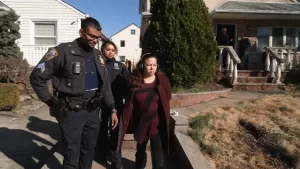Who Is Considered a Squatter in New York?
- A squatter is an individual who occupies a property without the owner’s permission or knowledge. There are several ways a squatter situation can arise:
- A person may enter a property legally with the occupant’s consent, but then remain after that consent has ended.
- A squatter may fail to vacate an apartment when their lease expires, refusing to pay rent. This type of squatter is a “holdover tenant,” particularly in New York
 City.
City. - A squatter may break into an abandoned building and start living there.
- An individual may mistakenly believe that a section of a property belongs to them and put up a fence or other barrier around it.
Do Squatters Have Rights in NYC?
Yes, squatters do have rights and protections in New York City (NYC) and New York State. In New York State, if a person lives on a property openly and continuously without the owner’s permission for at least 10 uninterrupted years, they can claim adverse possession, provided they have paid property taxes during those years.
However, the situation in New York City is more complex. The city has its own set of laws regarding adverse possession of apartments.
In NYC, squatters can obtain “squatter’s rights” after staying in an apartment for just 30 days. Yes, you read that correctly—ONLY 30 DAYS.
It is often financially easier for smaller landlords to negotiate a payment with the squatter to leave, rather than face costly and lengthy legal proceedings.
Since landlords in New York City have only 30 days before a squatter is legally a tenant, they must initiate eviction proceedings immediately upon discovering a squatter.
How To Gain Squatters’ Rights in NY?
In the United States, squatters seeking to claim adverse possession must meet five legal conditions. These specific conditions are also necessary for claiming adverse possession in New York State.
1. Actual
The first requirement to gain squatters’ rights is to have actual possession of the property. Actual possession, as the term suggests, means that the squatter has both control and occupancy of the property.
2. Open and Notorious
To claim adverse possession under the law, a squatter must occupy a property openly and notoriously. This means they cannot attempt to live there undetected.
3. Hostile
In the context of adverse possession, “hostile” means that the occupancy interferes with the property owner’s rights and interests. If you have permission to use the property, your occupancy is not hostile.
In New York, the requirement for hostility is even stricter; the squatter must have a reasonable belief that they hold title to the property.
4. Exclusive
Exclusive possession means that the squatter occupies the property solely and without any other person’s permission. It must be exclusively possessed by the adverse possessor as if they had full ownership rights.
5. Continuous
To successfully claim adverse possession, a squatter must reside at the property without interruption for a continuous period. In New York, this means the squatter must occupy the property continuously for ten years.
Squatters vs. Trespassing in New York
For the most part, squatting and trespassing are two distinct concepts. While you may assume that a squatter is simply trespassing, this is not the case; squatters are often entitled to legal protection under local laws.
Notably, squatting is a civil matter, whereas trespassing is treated as a criminal offense.
This means that if you call the police about squatters, they typically will not intervene to remove them. However, police officers can and will remove individuals who are trespassing.
It’s important to note that squatting can escalate into a criminal matter if the property owner has taken appropriate legal steps to establish that the squatter is no longer welcome on the property.
How To Evict a Squatter in New York State
1. Consult With a Real Estate Attorney
The first step to evicting a squatter in New York is to consult with an experienced real estate attorney.
Evictions in New York City are known to be lengthy, so having an accredited professional can provide valuable guidance and assistance throughout the entire process.
They can advise you and manage all aspects of the eviction process on your behalf.
2. Notify the Squatter to Leave the Property
As soon as you discover that squatters are occupying your property, you must notify them in writing. Keep in mind that if 30 days have already passed since their occupation began, the squatter is a tenant and you will need to go through judicial proceedings to evict them.
3. Serve the Squatter Notice
- 14-Day Notice to Pay Rent or Quit
- 10-Day Notice to Quit
- 30-Day Notice of Termination
If a squatter has become a legal tenant, you can serve them one of the following eviction notices.
14-Day Notice to Pay Rent or Quit
This document is a standard written notice related to a nonpayment summary eviction proceeding. It informs the tenant that they must either pay the full amount of rent owed or vacate the premises within 14 days. This type of eviction applies when the squatter is a former tenant whose lease has expired.
In such cases, you may demand rent at the rate that was effective before the lease expired. After the 14-day notice period has ended, the landowner can file a summary eviction proceeding in the county where the rental property is located.
10-Day Notice to Quit
You will issue this type of notice to a squatter who has been living at the premises for less than 30 days and is not considered a tenant under New York City law. The notice must inform the squatter that they have 10 days to vacate the property, and you must provide a reason for this request.
The reason typically cited is that the individual is a licensee or a squatter. Suppose the squatter has not vacated the premises by the end of the 10-day notice period. In that case, the landlord may file a summary eviction proceeding in the county where the property is located.
30-Day Notice of Termination
This is the standard notice used in a summary holdover eviction proceeding. You should use this notice if the squatter has been living at the premises for more than 30 days. When you provide a 30-day notice of termination, the tenant has 30 days to vacate the property.
Once the 30-day notice period expires, if the tenant has not vacated the premises, the landlord can file a summary eviction proceeding in the county where the property is located. Please note that the termination notice can extend beyond 30 days.
If a squatter or tenant has lived in the apartment for one year or more, under the Housing Stability and Tenant Act of 2019, they must be given at least 60 days’ notice.
4. File a Formal Eviction Proceeding
If the squatter does not leave after you have served them notice, the next step in the eviction process is to file a formal eviction proceeding. It’s important to remember that a tenant has the right to contest eviction proceedings to remain in the property, even if they ultimately know they will be evicted.
In New York, squatters are tenants after 30 days, so some may choose to take their chances, hoping that the eviction proceeding will work in their favor.
5. Win the Eviction Case
The landlord must strictly adhere to eviction laws in New York City and New York State to avoid having their case dismissed or experiencing unnecessary delays.
6. Let the Sheriff Evict the Squatter
After the landlord wins the eviction case, the Sheriff will evict the squatter from the property.
Can You Turn Off Utilities on a Squatter in New York?
No, you cannot turn off utilities for a squatter in New York. According to state law, it is illegal to remove a squatter without judicial intervention. This means that you cannot lock a squatter out of the apartment or cut off the electricity in hopes that they will leave. This rule remains in effect even after you have successfully evicted the squatter and won your case in court.
In other words, property owners are prohibited from personally removing squatters and must rely on the courts and the Sheriff’s office to carry out an eviction. Since most squatters are classified as tenants, landlords cannot arbitrarily cut off utilities in an attempt to make the squatter uncomfortable or compel them to leave.
Why Do Squatters Have Rights?
Squatters have rights that protect them from unscrupulous property owners who might attempt to take the law into their own hands. If property owners were permitted to deliver vigilante justice and use threats or violence to remove squatters, the situation could become dangerous. Therefore, the primary reason for squatters’ rights laws is to ensure there are proper legal channels to address these situations.
Squatter’s Rights in NYC Bottom Line
Squatters’ rights in New York City offer significant protections to individuals who occupy properties without the owner’s permission. These rights require landlords to adhere to strict legal procedures for eviction, which can result in lengthy and costly proceedings.
Although squatters do not have leases, they are treated similarly to tenants and can only be removed through court orders. Therefore, property owners must act quickly when discovering squatters. They should consult real estate attorneys early in the process and familiarize themselves with the eviction procedures to avoid complications and delays.


